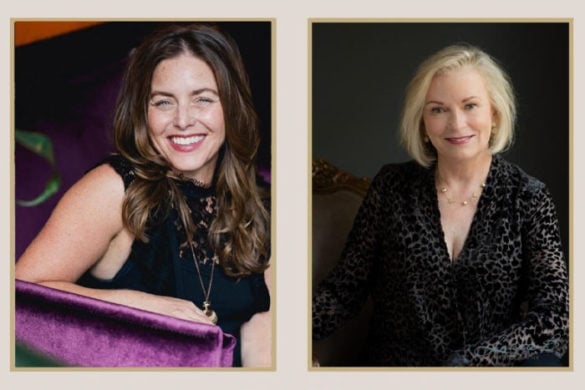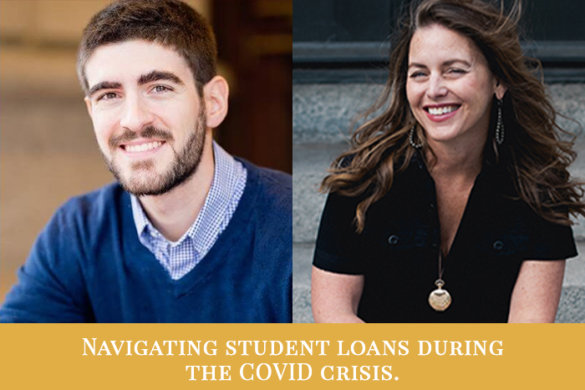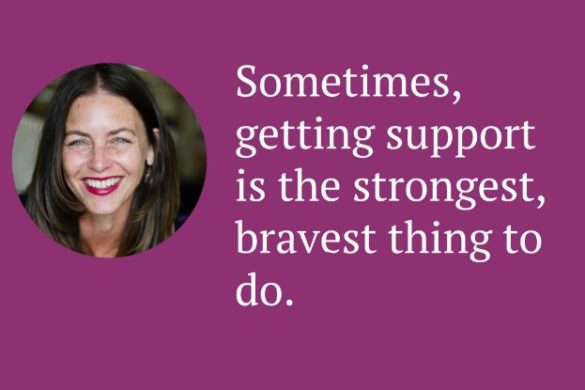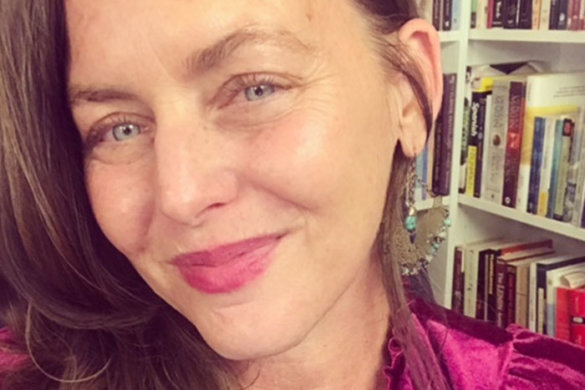Hi there,
this is Forest Linden here, Bari’s husband and business partner.
If you caught the last newsletter we sent out, you know that we’ve got a heap ton of things going on behind the scenes over here in Art of Money world. One of the side effects of those projects, like the writing of the Art of Money book that we’re working on, is that our normal flow of newsletters has been a bit disrupted of late.
So today, I’m grabbing the microphone and sharing a basket full of hand-picked resources with you that we’ve gathered over the past months. I’ll share these useful tid-bits in the style of my weekly curated newsletter, called Signals in the Noise.
Hope you enjoy this!
1. One hundred thank you’s.
“For the past year and a half, I’ve been painting and painting and painting my heart away in my studio. I’ve been making 100 paintings for 100 people that I am grateful for. I decided to do this project because I wanted to live a life of gratitude.” That’s Lori Portka, in a short film about what she did with an incredibly beautiful art project that spanned more than a year. Grab some tissues and have a watch of this film.
This project is such a beautiful demonstration of the power of gratitude in our lives. I’ve seen it happen in my life too, particularly around struggles with money. It seems like there’s always something we want that’s just beyond our financial reach. I can focus on not being able to get that thing-that-I-really-want and cause myself a lot of suffering. Or, I can hold the desire in my heart gently, then let it go by naming all the things that I’m grateful for in my life. It’s even more powerful if I do this little practice with my wife and 6-year-old son.
2. Breaking chains.
In a riveting interview on Medium, Kati Krause opens up the door inside the financial life of writer and speaker Ben Hammersley. It’s so refreshing and inspiring when people open up publicly about their financial realities. The locks and chains around our money life are so strong that we rarely get such an honest, vulnerable view into someone’s life like this.
When asked if he ever indulges in anything, Ben replies, “I made a vow to myself years ago when I was very poor that I would never drink bad coffee. So: Coffee, cigars, and afternoons in shisha cafés. I buy a new suit every five years or so. That’s a luxury because I’m so freakishly tall. But I’ll buy it and wear it for eight years. Also, I look fucking good in it, so I know it makes sense. But it’s still £5,000 ($7,500), so, fuck.”
3. After the cocoon.
“You’re learning how to do the new you. You’re re-acclimatizing to truth and joy and power. You’ll forget for a minute that you’re more powerful than you have ever been. And you’ll dip into an old pattern or habit. You’ll get all jangled and unnerved by the shit you ‘thought’ you just surmounted. That’s cool. You’re on track. You’re re-confirming your expansion.” Danielle Laporte on what to do after you have a breakthrough. It’s something I’ve never seen anyone address before: what happens after you have a huge insight, realization, or transformational experience. We give so much attention to getting to the place where the transformational event actually happens, but then what? Danielle gets to the heart of it, and I’m off to find my journal…
4. Better Call Jo Na.
“I had a client come to me, and she didn’t get the right advice about her businesses tax structure, and she ended up paying 50% of what she made that year in taxes and it shut down her business. [You] don’t want something like that happening just because you didn’t talk to a lawyer or accountant about the right business structure for you.” And with that, attorney Jo Na Williams gets at the true importance of something that most of us small business owners try to ignore for as long as possible: setting up the best business structures and legal protections for our business. Marie Forleo and Jo Na get into it all in this episode of MarieTV.
Yes, you can get away with ignoring these things for a little while, but it’s not the smartest choice. It costs a bit upfront to take care of setting up the right business structure (sole-prop, LLC, or S-Corp), getting legal protection in place for your goods and services, and making sure that you have clear contracts with your team members (like virtual assistants, copywriters, graphic designers, etc.), but a little prevention goes a long way.
5. The square root of your wallet.
Here’s one of the best personal finance tools we’ve come across in a while. Nerdwallet is an online service where you can ask them pretty much anything about personal finance, and you’ll get fast, useful help. Well, okay, let me qualify that. You can ask them traditional personal finance questions, like “What’s the best 401k for me to invest in?”, or “What’s the best credit card for me right now?” Or “Given my current health conditions and income, what’s the best health insurance option for me.”
You no longer need to make decisions like that in the dark. Go to Nerdwallet’s site and ask your questions right on the homepage. Using a combination of smart software and hundreds of human financial experts, they’ll get back to you with a personalized answer quickly via email. It’s kind of like instantly making a new friend who’s a math and statistics geek, only they focus their geekery on money.
6. Landmines in the basement.
“Of course, even the most routine conversations can be filled with emotional landmines when we’re in the mental basement. But just imagine the outcome if we try to talk about something as emotionally charged as money. In those low moments, before we even realize what’s happening, the simple act of opening something like the credit card bill can lead to World War III.” The New York Times’ Carl Richards, on stepping into territory that is both vital and challenging: having money conversations with your intimate partner.
Bari calls them “money dates,” but sometimes, the dates begin as battles, especially if you’re not feeling stable emotionally, mentally, or physically. Sometimes, the best money dates are those that you plan with intention. If done within a container of compassion and clarity, money conversations can lead to a depth of connection that’s difficult to reach by other means. But if you notice yourself reaching for your bow and arrows, try reaching for the chocolate instead. Make love, not war.
7. Teach your children well.
“When I was in grade two, I won a city-wide speaking competition, but nobody had ever said, ‘Hey, this kid’s a good speaker. He can’t focus, but he loves walking around and getting people energized.’ No one said, ‘Get him a coach in speaking.’ They said, ‘get me a tutor in what I suck at: French.’” That’s Cameron Herold, on the main TED stage, talking about why we should raise our kids to be entrepreneurs, instead of always steering them all into traditional “safe” paths, like being a lawyer or doctor.
He makes the case that in our schools, we aren’t nurturing kids who are showing traits of entrepreneurialism. Instead, we’re ignoring their gifts and preparing them to get “safe and secure” jobs. But if we teach our kids how to become entrepreneurs, at least the ones who show signs of having entrepreneurial traits, we could help them create solutions to some of the world’s biggest problems.
There’s some wonderful and inspiring parts of Cameron’s talk, particularly around lessons we can teach our kids about money. However, I disagree with one perspective he has about entrepreneurs. He feels that they don’t do things like accounting; they hire accountants.
It’s true, entrepreneurs are often those who don’t do well working for others, but I think there is great value in knowing what it’s like to work for someone else before you become an entrepreneur.
Creating a company culture that honors everyone in a company is one of the most important aspects of building successful businesses. I don’t think you can truly build a thriving company culture that deeply cares about all the employees unless you’ve had the experience of being an employee yourself. Entrepreneurs at the executive level are great. Don’t get me wrong. Without their innovation, many of the world’s biggest problems would go unsolved. But without a community of happy, thriving employees, the entrepreneur’s visionary ideas will remain just a dream.
That said, I still fully agree with Cameron that we should work harder to teach our children lessons about money and entrepreneurialism. And for that, this TED talk is well worth watching.
8. Gen Vexed
“In a new multi-generational survey by Northwestern Mutual, Gen X respondents reported the highest levels of financial insecurity of the four generations. Their number one concern: having enough savings to retire comfortably. Two-thirds said they expect to have to work past traditional retirement age out of necessity, and 18% believe they’ll “never retire.” USA Today, on the challenges facing us Gen X’ers when it comes to saving for retirement. For a number of reasons, it seems that most of us aren’t putting much away for our retirement savings.
The stark reality: we X’ers need to be putting away about 15% of our income over 30 years to have enough money to live on during our retired years. The data from this survey showed that only 12% of Gen X’ers were saving that much every year. And the rest of us? Are saving even less. Guess I better start designing an online program I can sell to aging Gen X’ers when I’m in my seventies and eighties: “How to build an online business you can run from a nursing home.”
9. Pay it off.
Here’s a great service if you’re in need of a way to pay off your credit card debt. It’s called Payoff and it allows you to set up a payment plan with a greatly reduced interest rate. You get a loan from Payoff to pay off your credit card debt, and you pay them back with a low, fixed interest rate (lower than the interest rate you had on your credit card.)
+ Forbes: The Ultimate Guide to Getting Out of Debt.
10. You are enough.
“What’s the use of working so hard? Everything is transitory. My yoga studio won’t last. My students will die. I’ll die. Why bother to wake up each morning and teach yoga? Why bother loving when our loved ones will eventually be taken away from us? And I come back to a quote from Mother Theresa, who said ‘What you spend years creating, others could destroy overnight. Create anyway.’” That’s Coleen Saidman Yee, in a beautiful video interview with Marie Forleo. (Yes, this is the second Marie video I’m linking to in this newsletter, but trust me, it’s worth it.)
Coleen tells wonderful stories about how she came to learn that she is enough, just as she is; how it took one of her mentors pushing her off a cliff for her to realize what she was meant to do; and how she learned, by working with Mother Teresa to serve the poorest of the poor in India, that the only way to peace is through service.
What does this have to do with money? Nothing. And everything. So much of what Coleen speaks of in this interview are the very things that come up for hundreds of people in each session of our year-long money school, The Art of Money. We can get at, and heal, these deeper issues through the doorway of money (which is one of the great gifts of our money issues). But once we get down there, we often realize that these things weren’t ever about money. It only appears that way from the surface.
Listen to the interview with Coleen and see if you’ve ever had any of the things she brings up come up in your own life around money. Then, let the prayer that Coleen reads at the end of the interview sink into your mind and heart. The next time you notice challenging emotions arise around money, call that prayer to mind and watch what happens within you.
You’re still reading this newsletter, all the way down here! That’s a beautiful thing. Who says people don’t read on the web anymore?
I hope you’ve found some golden nuggets in this newsletter…some things that can help you on the path of changing your relationship to money.
If you enjoyed this newsletter, we would be ever so grateful if you could share this newsletter with your friends. Every little shout out helps.
To make is easy, you can click on one of the links below and share something about this on your social media network of choice.
Thank you in advance if you feel inspired to share the love.
Until next time, keep going. One breath at a time and your relationship to money will keep changing for the better.

~Forest Linden
Founder at Clarity Lab





